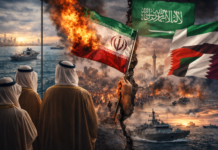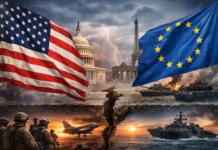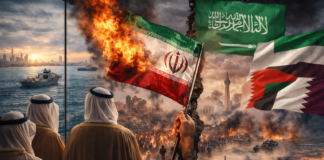Russian Warships Patrol the Black Sea: Geopolitical Tensions Escalate
The Black Sea, a body of water nestled between Ukraine, Russia, and several NATO countries, has become a focal point of intense military and geopolitical tensions.
Russian warships patrol its surface, launching missiles at Ukrainian towns, while simultaneously imposing a de facto blockade and threatening any vessel attempting to breach it.
Amidst this complex and evolving situation, Ukrainian sea drones are quietly skimming the water’s surface, carrying explosives towards Russian ports and vessels, augmenting Kyiv’s defensive capabilities.
Additionally, NATO and allied surveillance planes dominate the skies above, gathering crucial intelligence to counter Moscow’s invasion efforts. The Black Sea, often overshadowed by more direct battlegrounds, has emerged as a dangerous arena with significant implications for global stability.
The Geopolitical Cauldron of the Black Sea
Turbulent Waters: How the Black Sea Became a Hot Spot in the War




The Black Sea’s strategic importance stems from its unique geographical position, bringing Russia and NATO countries into close quarters unparalleled in other theaters of war. This close proximity escalates the risk of confrontation and inadvertently drags NATO into the conflict. The Black Sea, once a peaceful passage, has transformed into a zone of conflict, resembling the war-ridden territories elsewhere.
Russia’s Grain Deal Fallout
Tensions escalated when Russia terminated a deal ensuring safe passage for Ukrainian grain through its ports. In retaliation, Russia targeted Ukrainian Black Sea ports and even struck sites close to NATO member Romania. These aggressive actions heightened fears of NATO’s entanglement in the conflict, exacerbating an already precarious situation.
The Battle for Control: Implications and Challenges
Ukraine’s Counteroffensive
Ukraine’s response to Russia’s aggression has been multifaceted. Demonstrating their enhanced capabilities, Ukrainian sea drones successfully struck Russian ships, signaling a significant advancement in their maritime arsenal. Rear Adm. Oleksiy Neizhpapa, the Ukrainian navy commander, stressed the need to protect their coast and confront Russia’s tyranny in the Black Sea.
Global Ramifications
The conflict’s impact extends beyond regional borders. Control over the Black Sea holds implications for energy markets and world food supplies. Moreover, it poses a challenge for NATO to uphold free navigation principles without engaging Russian forces directly.
Dynamics with the United States
The United States’ involvement has been cautious yet impactful. While it prohibits American weapons against Russian territory, the US offers intelligence to Ukraine, aiding target selection. This assistance reflects the delicate balance of supporting Ukraine without escalating tensions with President Vladimir V. Putin.

Centuries of Geopolitical Struggle
The Black Sea’s Historical Significance
Throughout history, the Black Sea has been a focal point for Russia’s geopolitical ambitions. Its warm waters facilitate year-round trade, offering Russia a platform to project political power across Europe, the Middle East, and beyond. The Black Sea has witnessed multiple conflicts between Russia and other world powers, underscoring its enduring significance.
Modern Power Struggles
Recent years have seen Russia’s efforts to bolster its influence around the Black Sea. Vladimir Putin invested heavily in developing seaside ports and military installations to strengthen Russia’s southern fleet. Simultaneously, NATO member nations and partner countries in the region form a complex geopolitical landscape, amplifying tensions.
Escalating Confrontation: Emerging Dangers
Annexation of Crimea
Russia’s annexation of Crimea in 2014 marked a significant move to establish control over the Black Sea. This strategic maneuver escalated tensions and signaled Russia’s commitment to securing a foothold in the region.

Unintended Incidents
Growing risks of inadvertent incidents spiraling out of control have prompted NATO and its member states to increase air surveillance and policing missions over the Black Sea. Care is taken to avoid straying into the war zone while gathering crucial intelligence.
Economic Repercussions and Oil Markets
Global Energy Flow
The conflict’s impact on energy markets cannot be ignored. More than 3% of global oil and oil products pass through the Black Sea, with Russia historically exporting a significant share. Efforts by Ukraine to expand the conflict to Russia’s ports aim to exert economic pressure on Moscow.
Oil Prices and Resilience
The global economy is on edge due to surging oil prices caused by Russia’s invasion. While initial concerns about a shortage in Russian oil supplies led to price spikes, Russia’s resilience and alternative trading partners have kept the impact relatively contained.
The Road Ahead: Uncertainties and Complexities
A Game of Strategy
The Black Sea conflict underscores the intricacies of geopolitical maneuvering. Turkey’s role as a crucial gateway between the Black Sea and the Mediterranean adds further complexity. Balancing NATO’s presence, economic interests, and the risk of escalation requires delicate diplomacy.
The Increasing Role of Technology
Ukraine’s success with maritime drones highlights the growing significance of technological advancements in modern warfare. These stealthy and potent tools redefine conflict dynamics and challenge traditional power structures.
Conclusion
The Black Sea’s transformation into a militarized zone represents a critical juncture in global geopolitics. Russia’s aggressive actions, Ukraine’s strategic responses, and NATO’s delicate involvement all contribute to a complex and dynamic situation. As maritime drones alter the balance of power, and economic repercussions echo on the world stage, the Black Sea stands as a testament to the interplay between geopolitical maneuvering and technological innovation.
FAQs
- Is the conflict in the Black Sea limited to Russia and Ukraine? The conflict involves Russia, Ukraine, and NATO countries due to its geopolitical significance.
- What impact does the conflict have on oil prices? The conflict has raised concerns about oil prices due to disruptions in global energy flow.
- How has technology changed the nature of the conflict? Maritime drones have significantly altered the conflict’s dynamics, providing Ukraine with a strategic advantage.
- What role does Turkey play in the Black Sea conflict? Turkey’s control over key straits adds complexity to the situation, influencing NATO’s presence in the region.
- How does the Black Sea conflict affect global stability? The Black Sea conflict has far-reaching implications for global stability, given its impact on energy markets and geopolitical balance.






























